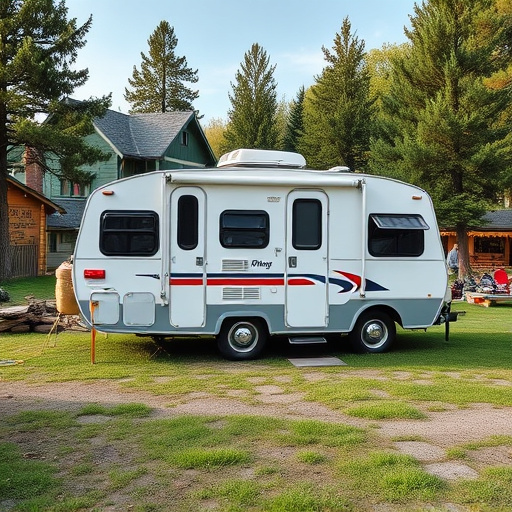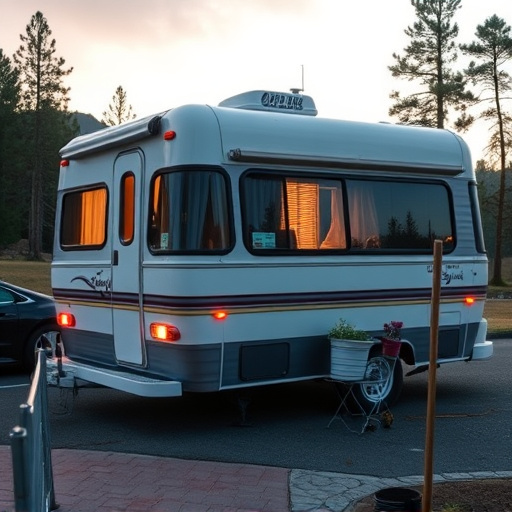The age and health of an RV battery significantly impact its performance and longevity. Regularly check battery voltage (at least 12.6 volts for a fully charged 12-volt battery) to detect capacity loss or internal damage, indicating the need for replacement after 3-5 years. Symptoms like engine refusal to turn over or insufficient power supply suggest battery issues; jump-starting is temporary relief, and regular maintenance can prolong life. Keep detailed records of maintenance activities to monitor battery health and facilitate warranty claims. Budget for battery changes, considering costs, installation, and potential eco-friendly options that support a greener lifestyle.
Is your RV’s power source losing its punch? It may be time for a new battery. This guide explores the key indicators that signal it’s time for a RV battery change, from age and performance declines to voltage readings and maintenance records. Learn how to identify signs of wear, budget for upgrades, and even explore eco-friendly options. Maximize your RV’s efficiency and ensure reliable power with the right battery replacement strategy.
- Age of the RV Battery: A Depleting Resource
- Performance Declines: Signs Your Battery Needs Replacing
- Voltage Readings: Checking Critical Levels
- Starting Issues: When Your RV Refuses to Turn Over
- Maintenance Records: Keeping Track for Proactive Care
- Cost Considerations: Budgeting for Upgrades
- Eco-Friendly Options: Choosing Sustainable Batteries
Age of the RV Battery: A Depleting Resource

The age of an RV battery is a significant factor in determining its performance and longevity. Over time, even under optimal conditions, these batteries lose their charge capacity. This deterioration is due to chemical reactions within the battery that degrade its components over extended use. As a result, older RV batteries may struggle to hold a charge, leading to frequent dead starts or reduced electrical functionality while camping.
Regularly checking your RV battery’s age and condition is essential maintenance. If your battery is nearing its typical lifespan—often around 3-5 years—it might be time for a replacement. Significantly decreased performance or frequent need for jump-starts are clear indicators that your RV battery is no longer holding its charge effectively, highlighting the necessity of timely replacement to ensure seamless and enjoyable RV trips.
Performance Declines: Signs Your Battery Needs Replacing

If your RV battery is showing signs of performance decline, it might be time for a replacement. Over time, batteries weaken and lose their capacity to hold a charge effectively. Look out for reduced power output, especially in essential systems like lighting, water pumps, and heating/cooling units. If you find yourself frequently having to jump-start your RV or notice that accessories don’t work as efficiently as they used to, these could be indicators of battery degradation.
Battery age is a significant factor; most RV batteries last between 3 to 5 years before their performance starts to diminish significantly. Extreme temperature fluctuations can also accelerate battery wear and tear. Pay attention to any unusual behavior or inefficiencies, such as dim lights, slow water heating, or difficulty starting the engine (in vehicles with an auxiliary battery). Regularly checking your RV’s battery voltage can help you monitor its health and identify potential issues early on.
Voltage Readings: Checking Critical Levels

Checking voltage readings is a crucial step in determining whether your RV battery needs replacing. Over time, a declining battery’s ability to hold a charge weakens, leading to lower voltage levels. Regularly monitor the voltage at rest and under load using a voltmeter. A fully charged 12-volt RV battery should read around 12.6 volts or higher when idle. If you notice consistent readings below 12 volts, it could indicate significant capacity loss and the need for a new battery.
When testing, pay close attention to critical voltage levels. For instance, a reading of 10.5 volts or lower while the engine is off suggests severe degradation and imminent failure. Additionally, monitor voltage fluctuations during operation; rapid drops can signal internal damage or short circuits. Regular voltage checks, especially before and after extended periods of use, will help you stay ahead of battery issues and ensure your RV’s electrical systems operate optimally.
Starting Issues: When Your RV Refuses to Turn Over

If your recreational vehicle (RV) won’t start, it could be a clear sign that your RV battery needs replacing. Starting issues, such as the engine refusing to turn over, are among the most common symptoms of a failing battery. When you turn the key or press the start button, but nothing happens, it’s often an indication that there’s insufficient power being supplied by the battery. This can be due to corrosion on the battery terminals, a loose connection, or simply a battery that’s reached the end of its lifespan and is no longer able to hold a charge effectively.
In such cases, trying to jump-start your RV might provide temporary relief, but it’s crucial to address the root cause. Regularly checking and maintaining your RV battery, including cleaning corrosion and inspecting connections, can help prolong its life. However, if these steps don’t resolve the issue, considering a complete battery replacement is essential to ensure your RV starts smoothly every time you’re ready for your next adventure.
Maintenance Records: Keeping Track for Proactive Care

Maintaining your RV battery is crucial for ensuring reliable power and extending its lifespan. Keeping detailed maintenance records is a proactive step that can prevent unexpected failures. Documenting every service, including battery tests, cleanups, and replacements, allows you to track performance over time. By doing so, you can identify patterns or declining trends in battery health, enabling you to take action before it’s too late.
Regular record-keeping also helps when it comes to warranty claims or identifying potential issues. Many RV owners find that a well-maintained battery log is a valuable tool for ensuring the overall integrity of their vehicle’s electrical system. This simple practice can save time, money, and potentially avoid hazardous situations associated with aging batteries.
Cost Considerations: Budgeting for Upgrades

When considering a RV battery change, cost is a primary factor that often comes into play. While it’s an investment upfront, budgeting for upgrades can ensure your long-term savings and overall experience. The price of a new RV battery varies depending on size, type, and quality, ranging from a few hundred to several thousand dollars. It’s essential to compare different models and brands to find the best value that meets your needs.
Additionally, factor in potential installation costs if you’re not comfortable doing it yourself. Many owners choose to have professional installers ensure the job is done safely and correctly. Keep in mind that regular maintenance, such as cleaning and testing, can also impact long-term expenses. By being mindful of these cost considerations, you’ll be better prepared for a smooth and budget-friendly RV battery upgrade process.
Eco-Friendly Options: Choosing Sustainable Batteries

When considering a battery change for your RV, opting for eco-friendly options becomes an essential part of your decision. Sustainable batteries are not just beneficial for the environment but also contribute to a greener lifestyle while on your travels. Look for products certified by reputable organizations that prioritize recycling and reduce harmful emissions during production. These include lead-acid batteries with improved recycling rates and longer lifespans, as well as lithium-ion alternatives known for their energy efficiency and reduced environmental impact.
Choosing batteries that align with eco-conscious values ensures you’re making a responsible choice without compromising on performance. Many manufacturers now offer options tailored to RV owners, ensuring these power sources are durable enough for your adventures while minimizing their ecological footprint.
When it comes to your RV’s battery, knowing when to make the switch is vital for maintaining your vehicle’s performance and ensuring a smooth travel experience. By understanding age-related degradation, monitoring performance, checking voltage levels, and keeping maintenance records, you can proactively replace your RV battery before it leaves you stranded. Investing in eco-friendly options not only benefits the environment but also ensures a reliable power source for your adventures. With proper care and consideration, you’ll be able to hit the road with confidence, knowing your RV’s power pack is up to the task.
